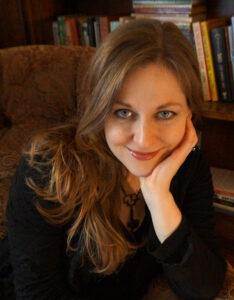Poets of the Dark: Interview with Jacqueline West

Jacqueline West’s poetry has appeared in Mythic Delirium, Dreams & Nightmares, Liminality, Enchanted Living, and Star*Line. Her collection Candle and Pins: Poems on Superstitions was released in 2018. She is also the author of the New York Times-bestselling middle grade series The Books of Elsewhere, the YA horror novel Last Things, and several other dark and twisty books for young readers. A three-time nominee for both the Rhysling Award and the Pushcart Prize, Jacqueline lives with her family in Minnesota. Find her on Instagram @jacqueline.west.writes or at jacquelinewest.com.
What sparked your interest in horror poetry? Was there a particular event or work that inspired you to delve into the darker side of poetry?
When I first fell head-over-heels in love with poetry as a kid, it was because of writers like Poe, Sexton, Plath, Roethke—so I think I started out on that darker side. Their themes and imagery showed me that a writer could explore deep, visceral things in ways that were honest and beautiful.
Can you describe your creative process when writing horror poetry? Do you have any rituals or techniques that help you tap into your darkest fears and bring them to life on the page?
I’m a longhand writer. I’ve never been able to draft a poem on the computer. To me, that first creative step has to be black ink on paper (preferably unlined paper in a sturdy notebook). And the best time of day for me, poetry-wise, is very early in the morning, when it’s still dark outside the windows, and the rest of my household is asleep. Something about starting out that way, when I’m just coming out of sleep and the daily routines and busywork haven’t crowded in yet, lets me connect to those darker, more dreamlike mental places.
How do you balance the need to be evocative and disturbing with the constraints of poetic structure and form? Are there any particular strategies you use to create tension and build suspense in your horror poems?
All of us are disturbed by different things, so my goal isn’t necessarily to disturb the reader. My first goal is clarity. Am I conveying what I want to convey? Whether that’s an image, or an emotion, or a concept, I need to make sure it gets across in words—and then I try to balance that communication with aesthetics.
Who are some of your favorite horror poetry inspirations? Are there any authors or poets whose work you admire and draw inspiration from when crafting your own dark verse?
I already mentioned Plath and Sexton, who still sit at the top of my pantheon. And there are so many dark/speculative poets writing today whose work I admire: Linda D. Addison, Stephanie M. Wytovich, Christina Sng, Sara Tantlinger, Beth Cato, Theodora Goss, Jeannine Hall Gailey…I could gush on and on.
Finally, what advice would you give to aspiring horror poets who want to explore the genre? Are there any particular challenges or pitfalls they should be aware of, and how can they overcome them to create truly terrifying poetry?
Writing with the intent to shock or scare the reader probably won’t work. You need to excavate the things that truly frighten (or obsess or sicken or fascinate) you. The honesty of that connection will be apparent in what you create.
And of course: Read! Read like wild. Read everything you can get your hands on. The more widely you read, the more distinctive your own writing will be.



